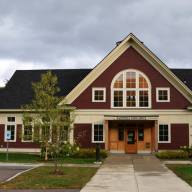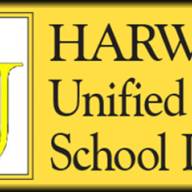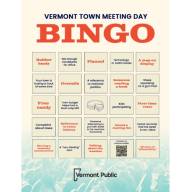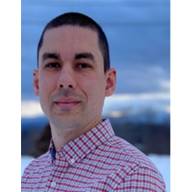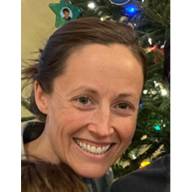On April 1, Warren-based community radio station WMRW (95.1 FM) will begin its annual on-air fundraising campaign. It will run until it has enough funds raised to cover yearly operating costs of about $13,000.
The station, located in the East Warren Schoolhouse, celebrates its 20-year anniversary this fall. It broadcasts 24 hours a day to the Mad River Valley, running on volunteer work as a noncommercial, small-scale operation. Its annual budget is funded entirely through donations from community members and ‘underwriting’ support – an alternative to commercial advertising that involves mentioning the financial support of local businesses on air.
DIVERSE OFFERINGS
A total of 37 local programmers convenes in the space each week – a 100-square-foot room with band posters plastered to the walls. They offer a diverse mix of music and talk shows.
The station also plays several prerecorded national alternative news shows that are not typically available through more mainstream airwaves.
Nuclear Hot Seat, which airs on Fridays at 6 p.m. documents oppositional perspectives on nuclear weapons and other aspects of the nuclear power industry. A recent episode reported from the International Uranium Film Festival in Tucson, Arizona, interviewing festival attendees on the ground. The Women’s International News Gathering Service, WINGS, follows on Fridays at 7 p,m. It’s an all-woman radio production company founded in 1986 that makes news about women from around the world.
John Barkhausen, the general manager of WMRW, started the station in 2004. Aside from his day job as a woodworker for 40 years, he volunteers his time at the station, doing everything from setting the program schedule, to reviewing applications for new shows, to providing trainings and paying bills.
Barkhausen’s own talk show, Politics and Science, which airs on Sundays at noon and Wednesdays at 5 p.m., showcases what he calls “minority opinions in science.” He got interested in alternative scientific and medical theories in the 90s as he struggled with a health issue, unable to find relief from conventional medicine. He became interested in the work of biologist Ray Pete, who began researching hormones in the late 1960s and is often seen as falling outside of mainstream science because he essentially offers a different perspective on the nature of living matter. Over the years, Barkhausen has interviewed him extensively on air.
“The whole reason I started the station – the whole reason for its being,” Barkhuasen said, “is for it to be a place where anyone can come and talk about what they’re interested in. Free speech is at the core of the station’s mission.”
RADIO WASTELAND
When Barkhuasen moved to Warren in 1976, there were only a few radio shows that reached The Valley, and only sporadically – including CHOM-FM, broadcast from the Mount Royal tower in Montreal, The Point or WNCS, and the AM station WDEV in Waterbury, which stopped running at sunset. “It was sort of a radio wasteland for many years,” Barkhuasen said.
When he heard Central Vermont Community Radio, broadcast from Goddard College in Plainfield starting in 1973, he got curious about community radio. “They reached out here, but barely,” he said, “and I liked it. It was just regular people on the radio, who were making mistakes.” He had a talk show there for two years and learned a bit about how running a station works.
In 2001, Barkhausen, along with the nonprofit Rootswork, which was founded in 1996 and owns WMRW, applied for a radio license through the Federal Communications Commission (FCC). About three years later, they got it, selecting 95.1 as their frequency, one that was available according to the FCC database. But after few weeks, the public station Radio Canada had switched to that frequency, and as a station with far more power, “they just totally blew us away,” Barkhausen said. “Where I live in East Warren, it was hard to even get the station a mile away – that’s how bad it was.”
WMRW had a weak signal for about 10 years, until it received approval from the FCC to change its frequency to 94.5 FM. In 2015, they installed a new 65-foot radio tower three miles north of the old one, leasing land from a local family. The signal improved.
Eventually, though, the property owners moved, and Barkhausen thought the station was finished. “It’s very difficult to find someone to allow us to put a tower up on their land,” he said. “But Pat and Shevonne Travers moved in, and it turned out that Pat had done community radio in college and really liked it. So not only did they let us stay, but they sold us an easement and now we’re there in perpetuity.”
CREATIVE OUTLET
Many of the station’s programmers said that hosting a show has become an important means of self-expression for them, as well as functioning as a form of social support.
The three members of Hot Soup Radio – Sam Gabriels, Adam Zawistowski and Annie Massie – said they feel a motivating force when they work together. “We could play literally anything together,” Massie said, “and the others would support it.” Their show, which airs on Mondays at 7:30 p.m., broadcasts everything from disco, to jazz, to psychedelic rock, to Beyoncé.
They said that sourcing new music to play is part of the fun. They scour blogs, music magazines, skateboarding videos, indie films, and other radio shows, as well as attending live shows and talking with friends about what they’re listening to lately. Gabriels is currently getting ideas from the book “Love Saves the Day: A History of American Dance Music Culture, 1970 1979,” which has playlists written into it.
Moretown residents Emily Taylor and Nicole Malone, whose show Monday Commute runs on Mondays at 4 p.m., said their show functions as a way to share recent music finds with each other. They build individual playlists throughout the week and take turns playing on air, discussing their picks. “It’s become a ritual for the two of us,” Malone said. Sometimes, listeners call the booth’s landline to chat about the music, Taylor added, and the two make it a point to play female, LGBTQ, BIPOC and other underrepresented voices.
As a non-music option, listeners can catch Warren residents Suzanne Hassanein and Nelson Brown with their show Cow Bell Trivia – airing every other Sunday night at 6 p.m. Trivia questions come in 12 categories, including snacks, tools, and Pokemon characters. For answers, they take call-ins at the studio, ringing a cow bell if the caller gets it right. Hassanein said it’s a way for her and Brown to “incorporate more silly into our lives.”
Hosting shows can be intensely personal, too. Malone said that having a show is a means of “relying on music for processing life,” with each playlist becoming a “store of memories, depending on what’s happening for me at that time.”
“I’m so appreciative that a community station exists, for us to have this kind of creative outlet,” Malone said.
Waitsfield resident Johno Landsman said that his show “has become a kind of therapy for me.” Airing Fridays at 8 a.m., “Recording Live from Somewhere” offers funk, soul, samba, Bossa nova and other genres of music. “Being in the room alone with a microphone that goes out into the world,” Landsman said, “is an experience that pushes me to be the most positive version of myself.”
To make a donation to support WMRW, visit wmrw.org and click on the pig, or mail a check to WMRW, P.O. Box 85, Warren, VT 05674. Businesses can support the station by becoming an underwriter and emailing




